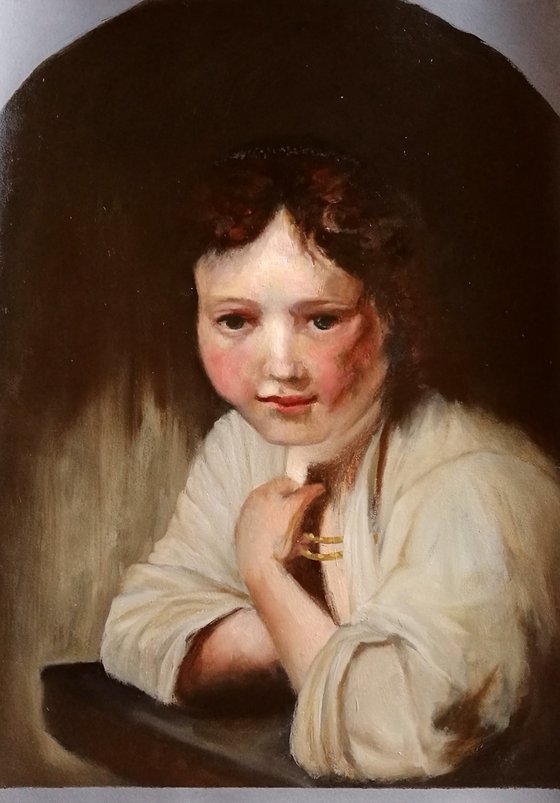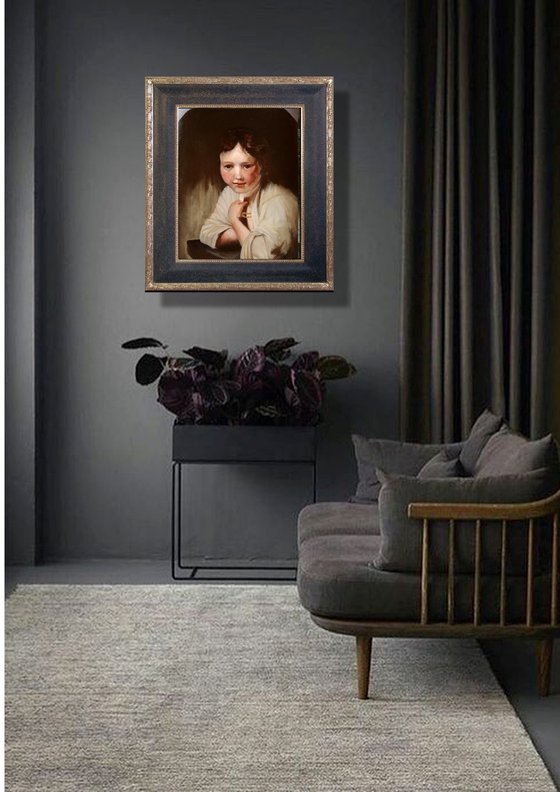- By medium
- By subject
- By budget
- Sales
- Gift cards
- Discover all art
- Artists
- Editors’ picks
- Ideas
Original artwork description:
This is a small study (30 x 40 cm) done in preparation of a large master study of Rembrandt's painting 'Girl at a Window'. The large painting is also for sale.
I have always been interested in Rembrandt's work and have done a lot of research into his working methods. There has been a lot of material written based on the research of his methods and after all this time we still don't know with certainty what his secret was to obtain the amazing glow and luminosity in his paintings, done with such bravura brushwork.
A few words about 'Girl at a window', painting that can be seen at Dulwich Picture Gallery. It also goes under the nickname: Mona Lisa of London because it certainly has that kind of enigmatic gaze, looking straight at us.
Painted in 1645 when Rembrandt was 39, this painting falls somewhere between genre and portraiture. The girl’s identity remains uncertain; in the past she has been described as a courtesan, a Jewish bride or an historical or Biblical figure. It is more widely accepted that she is a servant girl; her rosy, tanned complexion along with her brown arms implies she worked outdoors. Leaning on a ledge, she stares directly out of the painting while fiddling with her necklace, either a gold chain or a cord, like that seen around the cuffs and along the seams of her loose chemise. She also wears a small headdress, possibly a type worn in North Holland, and her hair is tied back with red string.
A frequently quoted account by the French art theorist and early owner of the work, Roger de Piles (1635-1709), claimed that Rembrandt put this painting in his window and passers-by mistook it for a real girl. While this story was not strictly true, it served as a general comment on Rembrandt's ability to create realistic portraits that could seduce his viewers. Such trompe l’oeil paintings, where the subject seemed to protrude out of the picture frame, became popular in the 17th century and Rembrandt continued to use and adapt this pose throughout his career.
Materials used:
Professional grade oil paint on primed multi-media paper, varnished for protection.
Girl at a Window (small study) - after Rembrandt (2019) Oil painting
by Daniela Roughsedge
31 Artist Reviews
£386.46
- Oil painting on Paper
- One of a kind artwork
- Size: 29.7 x 40 x 0.01cm (unframed) / 29.7 x 40cm (actual image size)
- Signed on the back
- Style: Expressive and gestural
- Subject: People and portraits
Loading
Original artwork description
This is a small study (30 x 40 cm) done in preparation of a large master study of Rembrandt's painting 'Girl at a Window'. The large painting is also for sale.
I have always been interested in Rembrandt's work and have done a lot of research into his working methods. There has been a lot of material written based on the research of his methods and after all this time we still don't know with certainty what his secret was to obtain the amazing glow and luminosity in his paintings, done with such bravura brushwork.
A few words about 'Girl at a window', painting that can be seen at Dulwich Picture Gallery. It also goes under the nickname: Mona Lisa of London because it certainly has that kind of enigmatic gaze, looking straight at us.
Painted in 1645 when Rembrandt was 39, this painting falls somewhere between genre and portraiture. The girl’s identity remains uncertain; in the past she has been described as a courtesan, a Jewish bride or an historical or Biblical figure. It is more widely accepted that she is a servant girl; her rosy, tanned complexion along with her brown arms implies she worked outdoors. Leaning on a ledge, she stares directly out of the painting while fiddling with her necklace, either a gold chain or a cord, like that seen around the cuffs and along the seams of her loose chemise. She also wears a small headdress, possibly a type worn in North Holland, and her hair is tied back with red string.
A frequently quoted account by the French art theorist and early owner of the work, Roger de Piles (1635-1709), claimed that Rembrandt put this painting in his window and passers-by mistook it for a real girl. While this story was not strictly true, it served as a general comment on Rembrandt's ability to create realistic portraits that could seduce his viewers. Such trompe l’oeil paintings, where the subject seemed to protrude out of the picture frame, became popular in the 17th century and Rembrandt continued to use and adapt this pose throughout his career.
Materials used:
Professional grade oil paint on primed multi-media paper, varnished for protection.
14 day money back guaranteeLearn more


